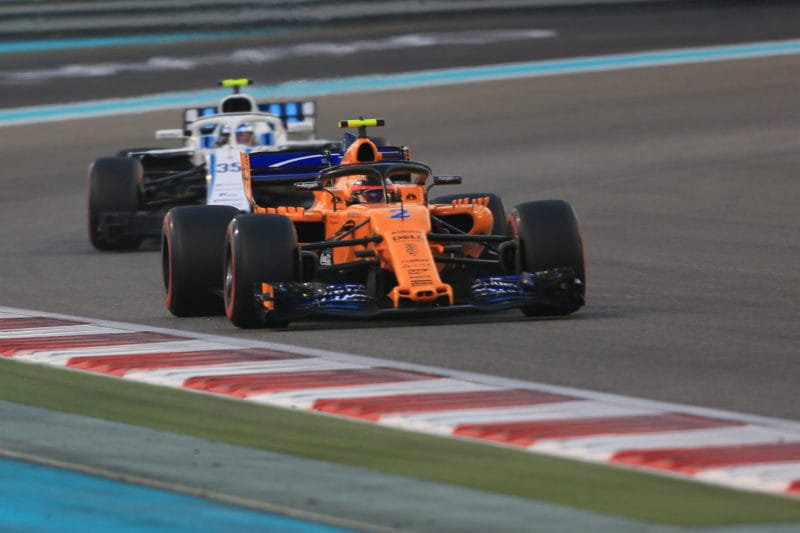As William Storey stretches out a hand to greet Jake Nichol from The Checkered Flag it is immediately striking just how avant-garde the CEO of Rich Energy, the new title sponsor of the Haas Formula 1 team, is.
The Bingham Riverside restaurant and hotel rents an optimal location on the banks of Richmond-upon-Thames, overlooking a hive of activity as people swarm about their business on one of the quieter meanders of the river: walking the dogs or trying to prevent their children from ending up in the drink.
This Georgian townhouse stands anonymous in this prime spot to the south-west of central London. Indeed, we walked past the building on multiple occasions, trying to uncover its whereabouts. Once inside, the aura of this five-star establishment is unmistakable as guests sit at their table, chatting and perusing the wine menu before their meals arrive.
And into this subtle tranquillity enters Storey, who is most definitely not subtle or tranquil. What he is, however, is a breath of fresh air into the sometime robotic, oft-regurgitation heavy, corporate-doused world of Formula 1. Storey has something to say. And this most straight-talking, calls-it-as-he-sees-it businessman (who has flirted with pretty much any business opportunity you can imagine, from a Zimbabwean tobacco farm to IT management) is going to do exactly that.
“We are about premium British performance, but we aren’t pretentious,” he says. “We want to ensure that we give customers a choice, and we want the consumer to be able to have an alternative. That’s all we are trying to do.
“We believe in competition, we love competition, that’s why Formula 1 is so great, and we look forward to competing with our competition, as I said before, on and off the track.”
That brings us neatly on to who, and what, Storey’s “billion-pound business” seeks to overhaul in the energy drinks market: Red Bull; which, of course, has two teams currently occupying tenancy over spots on the F1 starting grid.
Now, such an ambitious objective as attempting to unsettle and overhaul such an established and well-recognised brand such as Red Bull off the track and beat it on it comes with the raised eyebrow of scepticism. But Storey passionately defends his product which has, according to the website, been: “painstakingly developed and optimised over the last six years with leading beverage experts and [has been] recently launched in the UK and US”.
“How we are planning to dislodge them?” he ponders. “Well, fundamentally we have a better tasting, [and] a better-looking product [than Red Bull]. We have a better commercial proposition for retailers. We also feel that given Monster [Energy] is owned by Coca-Cola, and Red Bull is clearly a dominant corporate that set-up the [energy drinks] category in 1987 that there is an element of hubris, arrogance, and complacency in the marketplace. And because we are agile, innovate, unrestrained and acutely commercial, we are able to nip in and take swaths of business.

Storey has set his sights on beating Red Bull both on and off the track.
Credit: Octane Photographic Ltd
These ‘swaths of business’ Storey refers to include recently concluded deals on “about 20 million cans, which is pan-European,” and a deal concluded in April to expand the business further into the United States.
All good and well, but at launch, Storey made the claim to Autosport that “some of the biggest energy drinks suppliers in Europe are delisting Red Bull.” So, what does he say when those words are put back to him to substantiate those claims?
“We don’t want to advertise to Red Bull exactly where their business is disappearing,” he says. Neatly swerved, but Storey is at pains throughout our sit-down to stress that Rich Energy is not just involved in “the big thing” that is Formula 1.
“We are doing lots of different things [and] people are beginning to take us very seriously. Because we can’t be dismissed as just another energy drink; we’re not.
“We’ve been very clear that we are a British brand, the majority of our ambassadors are British, and we have multiple world champions [across sport in general],” he points out.
“[We sponsor 2017 Yachting Journalists’ Association] yachtsman of the year, Alex Thompson. We sponsor the SAS Boxing events, and Rich Energy ambassador Lucas Browne is fighting on April 20th on Sky Sports. (Browne lost by technical knockout in the third round of his heavyweight clash to Dave Allen.) We are doing Dave Johnson in the [Isle of Man] TT this year.”
At this point, business manager Tom Vernon, who has joined Storey, interjects to point out that the likes of Red Bull and Monster Energy “are complacent” and that “customers want something new.”
“The market place while crowded is not crowded with quality,” Storey picks up. “What I would like to say is that the extra mile is a lonely place, and we’ve gone the extra mile to ensure that we are ahead of the curve.”
So, with Rich Energy steadily increasing its reach in the sports marketing sector, the time was right to put out the feelers to see if a title sponsorship package could be agreed with a team – something Storey says was “in the back of my mind,” when he founded Rich Energy four years ago.
“My priority was to get the brand up and running and build the business,” he says. “Distribution was incredibly important in the early days, as was just building the brand. When I set it up, we didn’t have the resources that we have now [and] you have to cut your cloth, but I’ve always been a huge Formula 1 fan.
“I think it is without parallel, the number one platform for a brand like ourselves, which is all about performance. I’m a massive motorbike fanatic, so I love the [Isle of Man] TT as well, I love all forms of motorsport, but there’s no doubt Formula 1 is the pinnacle.”
The company’s first steps into negotiations to become involved with a team came in the summer of 2017, when Storey describes how “we negotiated intently for nine months to a year with Force India and got to a stage where we actually agreed a deal to buy the team.”
It is understood that the company’s offer a £30 million cash injection, in two £15 million sums was rejected by the administrators for the stricken Force India, which was eventually sold to the Lawrence Stroll-led Racing Point consortium.
With “our appetite for the sport whetted,” Rich Energy proceeded to talks with both the McLaren and Williams teams, but meetings with Gene Haas’ eponymous outfit convinced Storey that F1’s only American team was “by pretty much every metric,” the best option.
“They were certainly the best partner for us, we felt that they were the most entrepreneurial, that they were the real, true racers, and their approach to business, that they are very efficient, lean and mean…
“We felt McLaren’s proposition and the professionalism of their offering was exceptional, they are what we believed to be a top-drawer business, but we also feel that they are quite corporate in their ethos, and we are quite a gung-ho, innovative business, who aren’t necessarily wanting to be constrained by the ‘normal’ etiquette, if we can put it that way.
“[Haas] focuses on the priorities which is the car and the design, not Michelin starred chefs and that sort of thing. They were only three years old, [having entered F1 at the start of the 2016 season], we’re three-and-a-half, four years old, [so] similar age businesses. And I think one of the best things is that they are a David taking on the goliaths of motorsport and we are doing the same in the drinks business, so there’s actually a lot similarities between us, and they are owned by a self-made entrepreneur, whose created a mega business and so we’ve got a lot of respect for them.”

Rich Energy spoke to both McLaren and Williams in 2018, but settled partnering the Haas team.
Credit: Octane Photographic Ltd.
On balance, the Haas team had the fourth fastest car in the 2018 season, with the team scoring consistently over the season. Haas nearly doubled its points harvest from the ’17 campaign (93 plays 47) and only through operational mistakes (the double pitstop debacle in Australia) and Romain Grosjean’s poor early season form was it ultimately denied, by just 29 points, fourth in the constructors’ by the works Renault squad.
And it was about the time of the first Haas murmurings, in October of 2018 that the great paradox of our time, social media, went into overdrive, with individuals casting doubt over the validity and longevity of a company and product few had even heard of or seen on the shelves in the shops.
Storey puts this relative anonymity of his product from the high-street down to “a lot of the big chains saying no to us,” instead embarking on down “the independent route,” such as pubs, hotels, gyms, and the suchlike.
This is an entirely reasonable point to make for Storey to make. If your product is not visible to larger quantities of the “so-called detractors,” then it is virtually impossible for them to develop and foster an understanding of the inner workings of the company and its product.
“All of these so-called detractors have never met us, they don’t know who we are, they don’t know anything about us,” he says. “They are basing their opinions on absolutely nothing, zero research. We are delighted to speak to you or anyone else who wants to and we’ll speak about the business, and when they do come and see us, they go: ‘Oh, blimey, crikey, this isn’t what we thought’, and we disavow them of these fantastical notions and we educate these people. That’s something as I can, we’ve always been very open with people, and we welcome scrutiny.”
“There’s a lot of ignorance, people don’t know that much information, so they just make stuff up in their head,” argues Vernon, before Storey, in his own inimitable style adds: “A lot of people who were around the Force India thing were casting all sorts of ludicrous statements about us, quite frankly now have egg on their faces. Because they’ve been brutally exposed as clueless, so hopefully those clueless people can start having a clue, and they can start seeing what is going on. And they now know that Rich Energy is a serious business.”
Questions around the longevity of the business stem from a look at the financial records of Rich Energy, which are filed to Companies House, thus being released into the public domain. The most recent set of records, made up to the end of September 2017, show a small-scale operation, with just three employees – Storey included – with land or buildings resources valued at £1,708,811 with the value of then-stock at £1,002,851.
Once £1.3million has been repaid to Rich Energy’s creditors, this leaves the modest sum of £868,868 in the bank. When this is put into the context of budgets in Formula 1, it is therefore understandable that doubts are raised in the back of people’s minds.
Current constructors’ champions Mercedes spent around £300 million in its pursuit of the 2016 crowns, while Haas, then in its debut season competed on a budget of around a third of that, and after expenses, made a profit of £4.1 million.
Although certain sections of the public may not have faith in Storey or his company, the very fact that Gene Haas himself, and team principal Gunther Steiner – described by Storey as “the best in the paddock,” – agreed to the title sponsorship package should speak volumes and negate any doubt over the company’s viability.

Haas would not enter a risky deal with Rich Energy, while Steiner “is the best team principal in the paddock,” according to Storey.
Credit: Octane Photographic Ltd.
Having built his manufacturing business from scratch into a world leader, competed in US racing and then taken the plunge to set-up the first American F1 squad since the 1980s, Haas knows a chancer when he sees one.
His team would have scrutinised Rich Energy’s business model and financial footing forensically before embarking on the partnership. Only when Haas and his army of lawyers were satisfied completely would the contracts have been signed, leading to his cars to chameleon into sporting a black and gold paint job, a la the JPS Lotuses of the halcyon Colin Chapman zenith.
Moreover, the co-owner of West Ham United, David Sullivan is also a backer in the business. Sullivan, an “incredible businessman”, has toyed with a similarly wide-range of markets as Storey – from “number plates, to property to ringtones and football.”
His “simply unprecedented,” achievements of producing profits of a million pounds or more in 20 or so different markets also is a nod toward the validity of Rich Energy’s credentials.
Sullivan, who has a first-class degree in Economics, and the other investors in the company would not risk their capital in a business likely to fail. That would be pretty poor business acumen. Investors choose to invest because it makes sense for them, financially. He is one of the more successful British businessmen, so his continued involvement can only be seen plus. Faced with facts such as these, it is very hard for one of Rich Energy’s detractors to make their argument.
The day The Checkered Flag meets Storey is March 29th: The day Britain was supposed to leave the European Union. It would, therefore, be amiss not to get Storey to opine on Britain’s ultimate (or not) withdrawal from the bloc, and the eventual hardness or softness thereof. So, for those of you hoping this piece would provide sanctuary from the sheer relentlessness of You-Know-What, an apology on this writer’s behalf.
His views are quite forthright on his social media pages, with a firm belief that the country could prosper outside the EU, as a result of a ‘no-deal’ Brexit.
“I’m someone who actually believes in the EU,” he says. “I just feel that the terms of engagement have been so poor, that we should have had a better deal, [and] we were never offered that by the EU. Had [prime minister] Theresa May used no-deal as a sensible leverage, we’d have got ourselves a much better deal. She’s managed to fail that. Theresa May has directly cost this country £200 billion quid, that’s how inept she is. If she ran a corporate, she’d guide them into liquidation, let’s put it that way.”
And with that, Storey must dash off to finish packing for his trip to Bahrain the next day to see his company’s name and logo proudly adorn the side of a Formula 1 car.
He, and his company have earned the right to partner a grand prix racing team. When Red Bull entered the sport as a sponsor to Sauber in the 1990s, it was just seen as another new sponsor to add to the index. Rich Energy is no different.

Credit: Octane Photographic Ltd.



